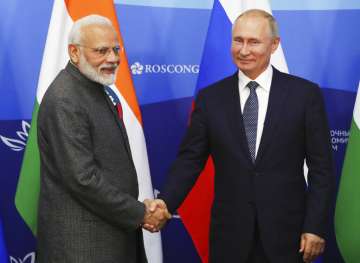India, Russia to collaborate on logistics support for armed forces
In a major development, India and Russia have decided to work towards the creation of an institutional arrangement for reciprocal logistics support for their armed forces as part of up-gradation of the bilateral defence cooperation.

In a major development, India and Russia have decided to work towards creation of an institutional arrangement for reciprocal logistics support for their armed forces as part of upgradation of the bilateral defence cooperation.
A joint statement issued a day after elaborate talks between Prime Minister Narendra Modi and Russian President Vladimir Putin here described the close bilateral cooperation in military and military-technical fields as "pillar" of the Special and Privileged Strategic Partnership and said the two sides agreed on collaborative development and production of military equipment and regular joint exercises of the armed forces of the two countries.
Modi, who is here on a two-day visit since Wednesday, held wide-ranging talks with Putin, covering all aspects of the bilateral ties and international issues of mutual interest.
"The (two) sides expressed their satisfaction with regular military contacts and joint exercises of the Armed Forces of the two countries. They welcomed the successful implementation of the 2011-2020 Long-Term Program for Military and Technical Cooperation. They agreed to speed-up elaboration of a new long-term plan of interaction in this area," the joint statement said.
"The (two) sides aspired to create favourable conditions for further development of bilateral cooperation between their armed forces and recognized the requirement of an institutional arrangement for reciprocal provision of logistic support and services for the Armed Forces. It was agreed to prepare a framework for cooperation on reciprocal logistics support," it said.
Modi and Putin reaffirmed their commitment to enhance military-to-military cooperation through military political dialogues, joint military exercises, staff-talks, training in each other's military institutions and through other mutually agreed area of cooperation.
They noted that the second Joint Tri-Services Exercises 'INDRA-2019' will be carried out in India this year. The statement also said the two sides have expressed their commitment to upgrade their defence cooperation, including by fostering joint development and production of military equipment, components and spare parts, improve the after-sales service system and continue holding regular joint exercises of the armed forces of the two countries.
"Both sides agreed to take forward ongoing engagement to encourage joint manufacturing in India of spare parts, components, aggregates and other products for maintenance of Russian origin Arms and defence equipment under Make-in-India program through transfer of technology and setting up of joint ventures," it said.
The joint statement said the India-Russia ties have "successfully coped with the turbulent realities of the contemporary world" and "have never been and will not be susceptible to outside influence".
Development of the entire gamut of India-Russia relations is a foreign policy priority for both countries, it said, adding the leaders agreed to facilitate, in all possible ways, exploring the impressive potential of our strategic partnership to the full, demonstrating its special and privileged nature which has emerged as an anchor of stability in a complex international situation.
The two sides also stressed the imperative of further strengthening of multilateralism, including the central coordinating role of the UN in world affairs.
They underlined the primacy of international law and emphasized their commitment to the purposes and the principles stated in the UN Charter, including the "inadmissibility of interference in the internal affairs" of member states.
"Both sides shared the view that implementation in good faith of genuinely-universally recognized principles and rules of international law excludes the practice of double standards or imposition of some States of their will on other States., and consider that imposition of unilateral coercive measures not based on international law, is an example of such practice," the joint statement said.
Both sides called for reform of the UN Security Council (UNSC) to reflect contemporary global realities and to make it more representative, effective and efficient in dealing with issues of international peace and security. Russia will continue to support India's candidacy for the permanent membership of a reformed UN Security Council, it said.